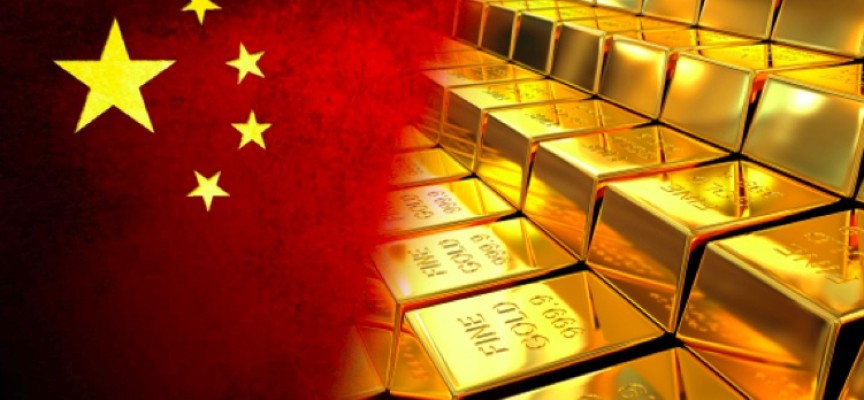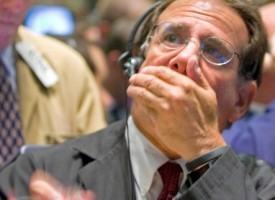As we near the end of what has been a wild summer, the U.S. war with China is heating up as China readies to launch a gold-backed monetary system.
U.S. War With China
August 19 (King World News) – Stephen Leeb: “These days almost every major news story seems to bear within it more evidence that the world is inevitably moving to a new monetary system centered on gold. The latest example: Friday’s firing/resignation of Steve Bannon.
His departure followed on the heels of his remarkably incautious interview with liberal commentator Robert Kuttner. Part of it was devoted to Bannon’s hard-line view of China. “We’re at economic war with China…we have to be maniacally focused on that…if we continue to lose it…we’re five years away, I think 10 years at most, from hitting an inflection point from which we’ll never be able to recover.”
Whatever you think of Bannon, he’s on the right track about China. But he’s gotten the time frame wrong. It won’t take five years to reach that inflection point. In fact, as I’ve been saying, we’re actually going through such an inflection point – let’s call it an inflection zone – already. And as China’s ascendancy grows, it will, inevitably, lead to a gold-centered reserve system…
IMPORTANT:
KWN receives so many emails from its global readers and listeners about which high-quality mining companies they should invest in, and as a result we have added another remarkable company to the list. This is one of the greatest gold opportunities in U.S. history and you can take a look at this remarkable company and listen to the just-released fantastic interview with the man who runs it by CLICKING HERE OR BELOW
Bannon’s comments about North Korea were also striking. He totally contradicted everything Trump and his military team have been proclaiming, saying it was nonsense to think the U.S. had a military option. He acknowledged that North Korea, and by extension China, have the upper hand because any military action by the U.S. would lead to the deaths of 10 million in Seoul in the first 30 minutes through conventional weapons alone.
Bannon raised the idea of a deal in which China would get North Korea to freeze its nuclear build-up and agree to verifiable inspections in exchange for the U.S. removing all its troops from South Korea. But he called the likelihood of that happening remote, though it wasn’t clear if that was because he thought it was Kim or the U.S. that would reject it.
But as I suggested in last week’s KWN interview, I don’t think such a deal is farfetched. Adam Mount, senior fellow at the Center for American Progress in Washington, seems to agree. He was recently quoted in The New York Times, referring to U.S. military exercises and arrangements with South Korea, as saying: “There is an opportunity here to put an offer on the table…we absolutely should be considering ways to modify their scope.” In that same article, Robert Carlin, retired CIA, analyst, agreed we should be scaling back our military activities in South Korea as part of a quid pro quo. The point, as the article makes clear, is that there are few alternatives. North Korea will continue to build its nuclear arsenal and will be able to threaten Japan. We’ll face the choice of reining in its nuclear program by exiting the Korea Peninsula or forcing Japan and South Korea ever more into the hands of China. Either way, China wins.
As I also noted in last week’s interview, Japan’s Abe already has made positive gestures to China by indicating a desire to join the Belt and Road initiative. Meanwhile, South Korea has elected as its new president — a dove on both North Korea and China.
China’s Move To A Gold-Backed Monetary System
China’s control of the Korean Peninsula equates to control of southwest Asia. It’s tantamount to de facto control of the entire East. I want to stress that whatever happens in Korea, China’s plans for a gold-centric monetary system will move forward. And a change may be closer at hand than most realize. That’s because of the exponential rise in the use of cryptocurrencies around the world, especially bitcoin and blockchains. Bitcoin is becoming a growing part of financial parlance, and its rapidly expanding presence, including in the US., could smooth the way to a new bitcoin/gold-based monetary system that could easily gain wide acceptance.
I see China as being extraordinarily crafty in dealing with this phenomenon. In the past year or so its role as a trader/market maker of bitcoin has collapsed. A year ago, around 80 percent of bitcoin trading was in China. Today it’s a worldwide phenomenon. China’s share has declined to around 16 percent, not that far from China’s share of global commerce, with the U.S. and other Western economies picking up the slack.
But what China nearly monopolizes is the so-called mining, or creation, of bitcoin. According to Jordan Tuwiner, a leading bitcoin trader, right now China controls more than 70 percent of bitcoin mining and the related mining necessary to maintain the block chains. The U.S controls only about 1 percent.
Running powerful computers around the clock, as bitcoin mining requires, consumes enormous amounts of electricity, and China has a huge edge because of its low-cost electricity – China is tied with India as the world’s lowest-cost producer. That, in turn, reflects China’s outsized hydroelectric capacity. Once you build the hydropower infrastructure, the electricity it generates is virtually free. Simply by situating massive computer centers close to hydropower sources, China can run them at almost no cost.
So it seems the pieces are gliding into position for China to initiate a reserve currency the world will accept. Still to come might be making changes in current bitcoin and blockchain regulations that would give central banks, including China’s PBOC, a greater and more transparent role, consistent with the decentralized distributive nature of cryptocurrencies. The final step would be to back the cryptocurrency with gold – which China has been amassing – and voila, you have a monetary system the world will be more than willing to accept.
Buy Physical Gold Below $1,300
Finally, I continue to believe that the catalyst for the inevitable transition from the dollar-based monetary system to one based on gold will be an Eastern oil benchmark controlled by China. In this regard, without going into detail here, all the evidence I see suggests demand for oil is on the verge of outstripping supply. Just look at two factoids. In the East, demand for oil is at record highs. But even in the U.S. over the past 52 weeks the moving average of oil demand is approaching eight- or nine-year highs. U.S. demand for oil this summer has been the greatest of any summer since the early part of the century. As the East continues to grow, where will the extra oil come from? Yes, there’s fracking, but as we’ve said before, fracking consumes as well as produces a lot of oil. So it would have to come from OPEC – except OPEC is within 3 percent of its all-time high production, meaning very little excess capacity.
We don’t expect China to do anything until after its fall party conference is over. Maybe it will wait until after the start of 2018. But change is coming. I don’t expect gold to break out just yet; it will probably await some of the above unfolding more clearly. But if gold does not decisively penetrate $1,300 here, don’t feel bad. Just buy more.”
***To listen to the remarkable audio interview with Rick Rule that was just released CLICK HERE OR ON THE IMAGE BELOW.
***ALSO JUST RELEASED: ENDGAME EXPOSED: The World Monetary System Has Now Buckled & Bubbled To The Point Of Final Termination CLICK HERE.
© 2017 by King World News®. All Rights Reserved. This material may not be published, broadcast, rewritten, or redistributed. However, linking directly to the articles is permitted and encouraged.









